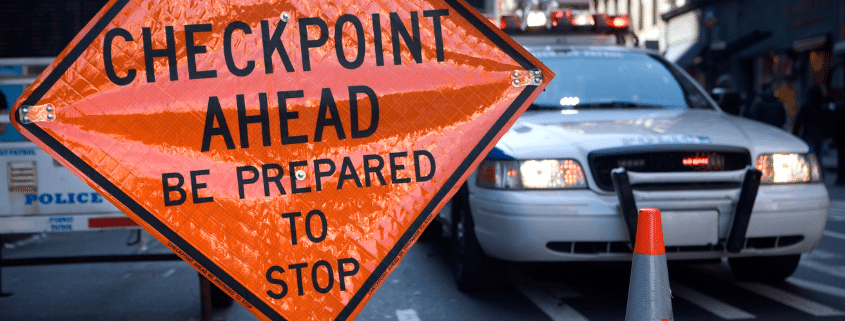You should be warned of a checkpoint before you encounter one. If it’s too late to take another route, you must think clearly and not panic. If you’re arrested, depending on the facts, you may have grounds for an effective defense.
Officers at sobriety checkpoints are supposed to evaluate drivers for evidence indicating they’re under the influence of drugs or alcohol. They may want to see if:
- A driver’s speech is slurred
- They can smell drugs or alcohol
- The driver seems to be impaired
If there’s evidence of impairment, the officer may ask you to exit the vehicle to perform field sobriety and blood alcohol testing.
How Do Sobriety Checkpoints Operate?
A 1990 US Supreme Court decision created roadblock procedures that police must follow before a valid arrest occurs. Subsequent lower court decisions refined what the court ruled. The Supreme Court ruled police can make a roadblock and stop your vehicle despite your Fourth Amendment rights against governmental intrusion into your freedom in Michigan Department of State Police v. Sitz.
The court ruled that:
- Checkpoints are a “seizure” under The Fourth Amendment, but the police, to improve public safety, need to cut alcohol- and drug-related vehicle accidents, so the intrusion is justified.
- Police can create roadblocks because stopping impaired drivers is more important than the negative effects of restricting drivers’ freedoms.
- The law enforcement agency conducting the stop must follow strict rules and treat all drivers equally.
- This means they must use a fairly enforced, systematic way to stop drivers based on a prescribed plan, not on other considerations, like the type of vehicle or person driving it.
- The plan must be established and approved before the roadblock starts. If their procedures change during the roadblock, police must record their reasons, and this new plan must be legal.
- Motorists must have an alternative route to the roadblock, and police can’t trap drivers who wish to avoid the roadblock. Those using an alternate route can’t be punished for doing so.
Generally, checkpoints operate when more drivers impaired by alcohol or drugs are expected to be on the road. In Colorado, the State Legislature used to fund sobriety checkpoints done by local police departments. This funding expired a few years ago and has not been renewed, so the number of checkpoints has decreased substantially. Also, some local police have determined that there are other ways to catch drunk drivers that are more cost-effective than checkpoints.
What Should I Do If I’m Stopped at a Checkpoint?
If you fear you may be perceived as impaired, your best option is to avoid the roadblock by using the alternate route. If you did not, the best ways to protect your rights are:
- Do not panic. Making rash decisions, appearing out of control, or making sudden movements may not only raise suspicions you’re impaired, but officers may perceive you as a threat and use force against you.
- Do not verbally answer any questions. It is important to be compliant and provide information that officers request, such as license, registration, and proof of insurance.
- Respond to an officer and act calmly, politely, and professionally
When you are pulled over, you may be asked to give a roadside hand-held breath test, but you are not required to do this hand-held test. If you are properly stopped and you refuse an evidentiary breath or blood test that would be done at the police station, your license will be suspended for one year if it is your first time refusing a test. Even if you’re not impaired, you will lose your license if you decline the test.
Contact Churchill DUI Defense For Assistance
Call Kevin Churchill at (303) 832-9000 for a free consultation if you’re arrested at a sobriety checkpoint. You can discuss the roadblock procedures, the facts of your case, what the police officers did, and how Colorado law may apply.
Just because you are arrested doesn’t mean you’ll be convicted. There may be defenses against the charges that could allow you to put the situation behind you so you can get on with your life.
